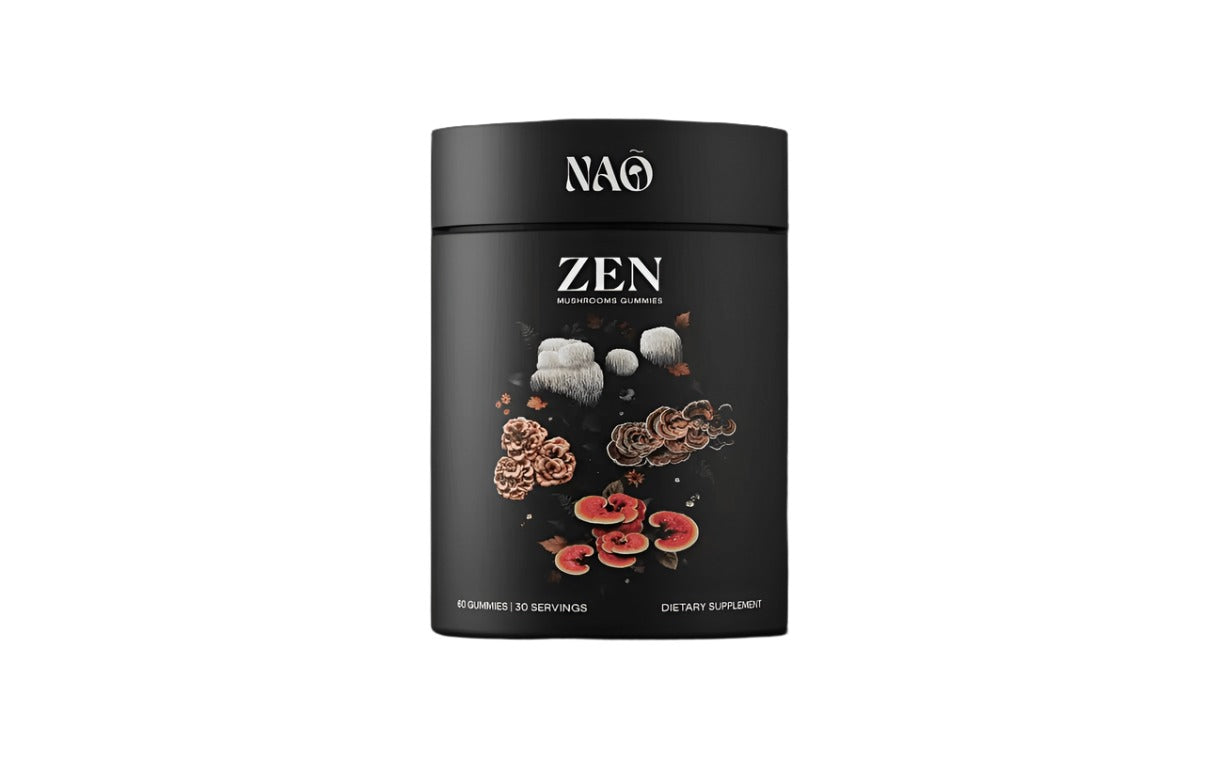In our modern world, where stress and health issues are prevalent, adaptogenic mushrooms emerge as nature's gift, offering a unique solution. These functional fungi, known for their ability to help the body adapt to stress, represent a significant aspect of natural wellness. This comprehensive article will explore the fascinating world of adaptogenic mushrooms, providing insights into their definition, types, and the myriad benefits they offer.
Understanding Adaptogens
Adaptogens, a term that has garnered much interest in the realms of herbal medicine and wellness, refer to natural substances that help the body adapt to stress and exert a normalizing effect upon bodily processes. The historical context of adaptogenic mushrooms is rich and diverse, with traditional use in various cultures such as Chinese and Ayurvedic medicine. These natural compounds work by interacting with the body's stress-response system, helping to reduce damage caused by chronic stress and promote better overall health.
Exploring the Main Types of Adaptogenic Mushrooms
Each adaptogenic mushroom has a unique profile, rich in history and health benefits:
1.Reishi (Ganoderma lucidum):
Historical Background: Revered in Asian cultures for thousands of years, Reishi was traditionally associated with longevity and spiritual potency.
Key Benefits: Known for its calming effects, it enhances sleep quality, reduces stress, and supports immune function. Reishi also plays a role in regulating blood pressure and cholesterol, offering cardiovascular benefits. Usage and Consumption: Often consumed as tea, extracts, or in capsule form, Reishi's slightly bitter taste is usually masked when mixed with other ingredients.
2. Cordyceps (Cordyceps sinensis):
Historical Background: Once a well-kept secret among Chinese athletes, Cordyceps gained worldwide attention for its role in enhancing physical performance.
Key Benefits: It boosts energy levels, increases oxygen uptake, and enhances athletic performance. Cordyceps also supports kidney and lung health.Usage and Consumption: Available in powder, tincture, or capsule form, Cordyceps can be easily integrated into daily routines.
3. Lion's Mane (Hericium erinaceus):
Historical Background: Traditionally used in Japanese and Chinese medicine, Lion's Mane has long been known for its beneficial effects on the brain and nervous system.
Key Benefits: It stimulates the production of nerve growth factor, supporting cognitive functions and potentially aiding in the prevention of neurodegenerative diseases. Usage and Consumption: Lion's Mane can be consumed as a supplement, in tea, or even used in cooking, adding a seafood-like flavor to dishes.
4. Chaga (Inonotus obliquus):
Historical Background: Used for centuries in Siberia and parts of Asia, Chaga was traditionally brewed into a tea for overall health and longevity.
Key Benefits: Rich in antioxidants, it boosts the immune system, fights inflammation, and has potential anti-cancer properties.
Usage and Consumption: Commonly consumed as a tea or extract, Chaga has a mild, earthy flavor.
5. Shiitake (Lentinula edodes):
Historical Background: A staple in Asian cuisine, Shiitake has also been used medicinally for centuries.
Key Benefits: It enhances immune function, improves cardiovascular health, and is studied for its cholesterol-managing properties.
Usage and Consumption: Shiitake is widely used in cooking for its rich, umami flavor and is also available as supplements.
Health Benefits of Adaptogenic Mushrooms
In the search for natural health solutions, adaptogenic mushrooms have emerged as a powerful tool. These remarkable fungi are not only known for their ability to adapt to their environment, but also for their potential in supporting human health in various ways. This article delves into the diverse health benefits of adaptogenic mushrooms, focusing on their role in immune system support, stress reduction, cognitive enhancement, energy boosting, and anti-inflammatory effects.
Immune System Support
One of the most celebrated benefits of adaptogenic mushrooms is their ability to bolster the immune system. These mushrooms contain high levels of beta-glucans, polysaccharides that are known to stimulate the immune system, enhancing the body's ability to fend off pathogens. For example, mushrooms like Reishi and Shiitake have been studied for their immune-modulating properties. They can help increase the production of white blood cells, which are crucial for fighting infections and illness. This makes adaptogenic mushrooms a valuable addition to any regimen focused on maintaining or improving immune health.
Stress Reduction and Adaptogenic Properties
Adaptogenic mushrooms are named for their unique ability to help the body adapt to stress. They exert a balancing effect on the body's stress response system, particularly the hypothalamic-pituitary-adrenal (HPA) axis. This can lead to improved resilience against physical, mental, and environmental stressors. Reishi, for instance, is known for its calming effects, often used to reduce anxiety and improve sleep quality. Similarly, Cordyceps can help the body manage and mitigate the effects of stress, promoting a sense of overall well-being.
Cognitive Function and Brain Health
Certain adaptogenic mushrooms, such as Lion's Mane, have shown promise in supporting cognitive function and brain health. Lion's Mane contains compounds that stimulate the growth of brain cells and can potentially improve memory and concentration. These cognitive benefits are particularly valuable as they suggest a potential role for adaptogenic mushrooms in slowing down or mitigating the effects of neurodegenerative diseases like Alzheimer's.
Energy and Endurance
Adaptogenic mushrooms can also play a significant role in boosting energy and endurance. Cordyceps, in particular, is renowned for its ability to increase energy levels. It does this by improving the way the body uses oxygen, especially during exercise. This can lead to enhanced physical performance, increased stamina, and reduced fatigue, making Cordyceps a favorite among athletes and those seeking natural ways to boost their energy levels.
Anti-inflammatory Effects
Many adaptogenic mushrooms have anti-inflammatory properties, which are crucial in managing chronic inflammation in the body. Chronic inflammation is linked to numerous health issues, including heart disease, diabetes, and certain cancers. Mushrooms like Chaga are rich in antioxidants and have been shown to reduce inflammation, thereby potentially lowering the risk of these chronic conditions. This anti-inflammatory effect, coupled with their antioxidant properties, underscores the role of adaptogenic mushrooms in promoting overall health and longevity.
The health benefits of adaptogenic mushrooms are varied and significant. From supporting the immune system and reducing stress to enhancing cognitive function, energy, and endurance, and offering anti-inflammatory effects, these natural wonders are a valuable asset in the pursuit of health and wellness. As research continues to evolve, the potential of adaptogenic mushrooms in preventive health and as therapeutic agents becomes increasingly clear, marking them as essential components in the natural health toolkit.
Incorporating Adaptogenic Mushrooms into Your Routine
Adaptogenic mushrooms can be incorporated into your diet in several forms, making them a versatile addition to your wellness regimen:
- Teas: Mushroom teas are a popular and soothing way to enjoy adaptogens. Simply steeping mushroom powder or dried mushrooms in hot water creates a therapeutic brew. Reishi and Chaga teas are particularly popular for their calming effects and rich antioxidants.
- Tinctures: Tinctures are concentrated liquid extracts. They are made by soaking mushrooms in alcohol or vinegar to extract their active ingredients. Tinctures offer a convenient and quick way to consume adaptogens, usually administered under the tongue for fast absorption.
- Powders: Mushroom powders can be easily added to smoothies, coffee, or other foods. This form is excellent for those who want to incorporate adaptogens into their diet without significantly altering the flavor of their meals.
- Supplements: Available in capsule or tablet form, supplements are a straightforward and measured way to include adaptogenic mushrooms in your daily routine. They are ideal for those who prefer not to taste the mushrooms.
Dosage Guidelines
The appropriate dosage of adaptogenic mushrooms can vary depending on the type of mushroom and the form of consumption. It's important to follow the manufacturer's recommendations on any product you use. Generally, a daily dose can range from 500 mg to 2000 mg. However, it's crucial to start with a lower dose and gradually increase it to see how your body responds. Consistency is key when using adaptogens; their benefits are typically observed over time with regular use.
Potential Risks and Side Effects
Although adaptogenic mushrooms are typically safe for the majority of individuals, they may lead to side effects or have interactions with specific medications:
- Allergic Reactions: As with any natural product, some individuals may experience allergic reactions. Symptoms can include itching, rash, or difficulty breathing.
- Medication Interactions: Certain mushrooms can interact with medications, such as blood thinners or diabetes medication. It is crucial to consult with a healthcare provider before starting any new supplement, especially if you have pre-existing medical conditions or are on medication.
- Digestive Upset: Some people may experience digestive issues such as nausea or upset stomach, especially when first incorporating these mushrooms into their diet.
- Pregnancy and Breastfeeding: Due to the lack of research, it is recommended that pregnant or breastfeeding women avoid adaptogenic mushrooms.
Incorporating adaptogenic mushrooms into your routine can be a beneficial addition to your health and wellness practices. Whether you prefer teas, tinctures, powders, or supplements, there is a method that can suit your lifestyle. However, it's important to be mindful of dosage and aware of potential side effects. As with any supplement, consulting with a healthcare provider is advisable, especially for individuals with existing health conditions or those taking medication. With the right approach, adaptogenic mushrooms can be a valuable ally in your journey towards optimal health.
Research and Scientific Evidence
The burgeoning interest in natural health solutions has brought adaptogenic mushrooms into the spotlight, sparking extensive research and scientific inquiry. These fascinating fungi, known for their stress-relieving and health-boosting properties, have been the subject of numerous studies. This article delves into the scientific evidence supporting the efficacy of adaptogenic mushrooms and examines the current trends in adaptogen research.
Studies Supporting the Efficacy of Adaptogenic Mushrooms
Over the past few decades, several studies have been conducted to explore the potential health benefits of adaptogenic mushrooms. These studies have provided a scientific basis for many of the traditional claims about these natural substances.
Immune System Support: Research on mushrooms like Reishi and Shiitake has shown their effectiveness in boosting the immune system. A study published in the "Journal of Ethnopharmacology" demonstrated that Reishi mushrooms could enhance immune response due to their high polysaccharide content.
Stress Reduction: The adaptogenic properties of mushrooms such as Reishi and Cordyceps have been studied extensively. A study in the "Journal of Alternative and Complementary Medicine" found that Cordyceps helps reduce fatigue and improve stress tolerance.
Cognitive Function: Lion's Mane mushroom has gained attention for its potential in enhancing cognitive function. A study in "Phytotherapy Research" reported that Lion's Mane could stimulate nerve growth factor synthesis, which is crucial for brain health.
Energy and Endurance: Cordyceps, in particular, has been studied for its energy-boosting properties. Research published in the "Journal of Dietary Supplements" found that supplementation with Cordyceps extract improved exercise performance and energy levels in healthy older adults.
Anti-inflammatory Effects: Chaga mushroom has been the focus of studies due to its anti-inflammatory properties. A study in the "World Journal of Gastroenterology" found that Chaga could reduce inflammation in the gut, suggesting its potential in treating inflammatory bowel diseases.
Current Trends in Adaptogen Research
Current research trends in the field of adaptogens are focusing on several key areas:
Molecular Mechanisms: Scientists are delving deeper into understanding the molecular mechanisms behind how adaptogenic mushrooms exert their effects on the human body.
Clinical Trials: There is an increasing emphasis on conducting clinical trials to validate the traditional uses of adaptogenic mushrooms and to establish standardized dosages and formulations.
Combination Therapies: Researchers are exploring the synergistic effects of combining adaptogenic mushrooms with other natural substances or conventional treatments.
Personalized Medicine: With the rise of personalized medicine, there is a growing interest in how individual genetic variations might influence the effectiveness of adaptogens.
Safety and Toxicology: As the use of adaptogenic mushrooms increases, so does the focus on their safety profile and potential toxicological effects, ensuring their safe consumption.
The body of research and scientific evidence supporting the efficacy of adaptogenic mushrooms is continually growing, shedding light on their potential health benefits. These studies not only validate traditional knowledge but also pave the way for new, innovative applications in health and wellness. As research evolves, adaptogenic mushrooms are poised to play an increasingly significant role in the field of natural health and personalized medicine.
Integrating Adaptogens into Holistic Wellness
Integrating adaptogens into a wellness routine is not just about adding a new supplement; it's about complementing and enhancing existing health practices. Here’s how adaptogens can synergize with various aspects of a healthy lifestyle:
- Balanced Diet: Incorporating adaptogens into a balanced diet can amplify their benefits. For instance, adding adaptogenic mushroom powders to nutritious smoothies or using them in healthy cooking can enhance the nutritional value of meals.
- Regular Exercise: Exercise is a cornerstone of good health, and adaptogens can play a supportive role. For example, Cordyceps is known for boosting stamina and energy levels, potentially enhancing workout performance and recovery.
- Mindfulness and Stress Reduction: Practices like meditation, yoga, and deep breathing are vital for stress management. Adaptogens like Reishi can complement these practices by physiologically aiding the body's stress response.
- Quality Sleep: Sleep is crucial for overall health, and adaptogens such as Ashwagandha and Reishi can help improve sleep quality. They can be taken in the evening as a tea or supplement to promote relaxation and better sleep.
- Hydration and Detoxification: Proper hydration is essential for detoxification and overall health. Adding adaptogenic herbs to water or herbal teas can make hydration more effective and enjoyable.
Expert Recommendations and Tips for Optimal Results
To maximize the benefits of adaptogens in holistic wellness, it’s important to consider the following expert recommendations:- Start Slowly: When introducing adaptogens into your routine, start with a low dose and gradually increase it. This allows you to observe how your body responds and adjust accordingly.
- Consult Healthcare Professionals: Before adding any new supplement to your routine, it’s advisable to consult with a healthcare provider, especially if you have pre-existing conditions or are taking other medications.
- Choose High-Quality Products: Not all adaptogen products are created equal. Opt for high-quality, organically sourced adaptogens to ensure maximum efficacy and safety.
- Listen to Your Body: Pay attention to how your body responds to adaptogens. Everyone’s experience can vary, so it’s crucial to tune into your body’s signals and adjust your regimen as needed.
- Combine with Complementary Therapies: Consider pairing adaptogens with other natural therapies like acupuncture, massage, or aromatherapy for a more holistic approach.
- Stay Informed: Keep abreast of the latest research and developments in the field of adaptogens to make informed decisions about your wellness strategy.
In conclusion, adaptogenic mushrooms offer a multifaceted approach to health and wellness in our modern world, where stress and various health issues are prevalent. These functional fungi, deeply rooted in traditional medicine and validated by contemporary research, serve as a natural aid in stress management, immune support, cognitive function enhancement, energy boosting, and providing anti-inflammatory benefits. From the calming Reishi to the energizing Cordyceps, and the cognitive-boosting Lion's Mane, each adaptogen has a unique role in promoting health.
The integration of adaptogens into daily routines through various forms like teas, tinctures, powders, and supplements allows for flexibility in consumption, catering to individual preferences and lifestyles. However, it's important to approach their use with mindfulness, adhering to recommended dosages and being aware of any potential side effects or interactions, especially for those with pre-existing health conditions or on medication.
Scientific studies reinforce the effectiveness of adaptogenic mushrooms in various health aspects, paving the way for their increasing role in natural health and personalized medicine. Furthermore, integrating adaptogens into holistic wellness practices amplifies their benefits, synergizing with a balanced diet, regular exercise, stress reduction techniques, quality sleep, and proper hydration.
Adaptogenic mushrooms, with their diverse benefits and versatile uses, stand out as a valuable component in the natural health toolkit, offering a harmonious blend of ancient wisdom and modern science. As research continues to evolve, adaptogens are set to play an increasingly significant role in the pursuit of optimal health and well-being.













